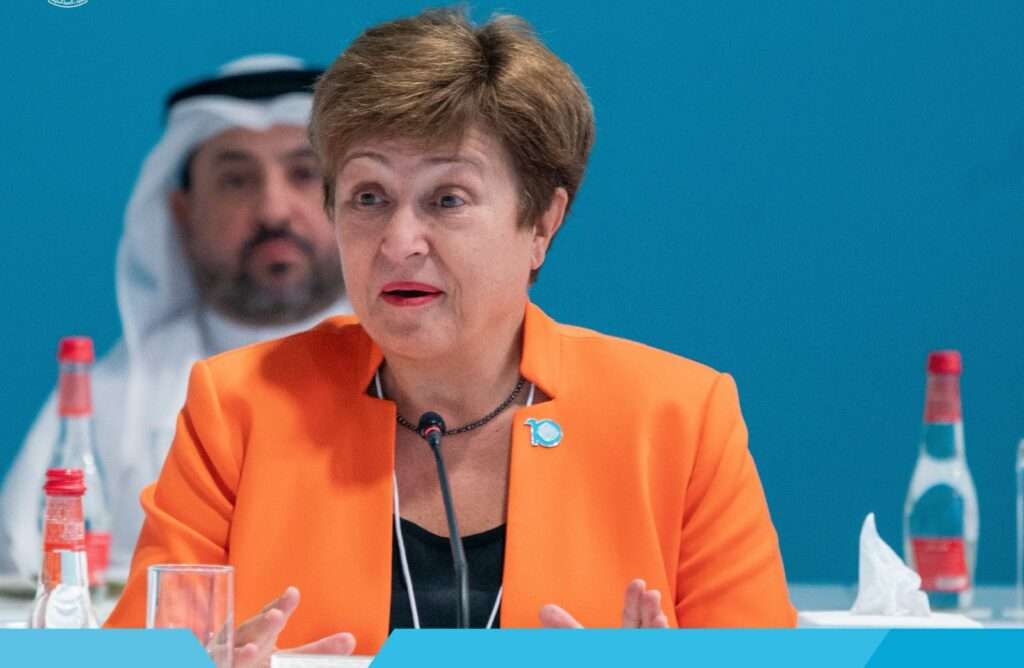Kristalina Georgieva, Managing Director (MD) of the International Monetary Fund (IMF) has indicated that unsustainable debt can only be addressed through Multilateral Cooperation. Can this be a life saver for a high debt profile country like Ghana?
Speaking during the Seventh Arab Fiscal Forum recently held at Dubai, touching on the theme: ‘How To Strengthen The Resilience Of Public Finances To Protect Our People, Our Economies, And Our Climate’, Ms. Georgieva noted that domestic policies are simply not enough to resolve the unsustainable debt challenge faced by most countries.
According to the IMF Managing Director, crushing debt burdens weigh on spending on health, education, and infrastructure – hitting hardest the vulnerable.
“…This is where teamwork comes in. With so many public and private creditors, unsustainable debt can only be addressed through multilateral cooperation.”
Ms. Georgieva

Continuing, Ms. Georgieva made reference to the ‘Debt Service Suspension Initiative’, which was launched by G20 during the Saudi Presidency in 2020, in response to Covid crisis.
The Common Framework for debt resolution followed but three years later, the job still needs to be completed, Ms. Georgieva said.
“Much work remains to make debt treatment faster and more predictable and to ensure it reaches all countries that need it. Now is the time to move the ball forward, not just on sovereign debt.”
Ms. Georgieva
Touching on the global and regional economic outlook, Ms. Georgieva pointed out that global growth as has always been is weak.
“Global growth remains weak, but it may be at a turning point. After expanding by 3.4 percent last year, we see growth slowing to 2.9 percent in 2023 and rebounding slightly to 3.1 percent in 2024. We released our latest forecast two weeks ago. While less gloomy than in October, we still project slower growth, and the fight against inflation remains a priority for 2023.”
Ms. Georgieva
On the positive, Ms. Georgieva speculates inflation declining from 8.8 percent in 2022 to 6.6 percent in 2023 and further down to 4.3 percent in 2024. Although, she added that for most countries, inflation will still be above pre-pandemic levels.
“China’s reopening is helping, as well as resilient labor markets and consumer spending in the US and the EU. While this is encouraging, the balance of risks remains tilted to the downside. China’s recovery could stall.
“Inflation could remain higher than expected, requiring even more monetary tightening—which could cause a sudden repricing in financial markets. And Russia’s war in Ukraine could escalate, causing further fragmentation of the global economy.”
Ms. Georgieva
Growth is expected to drop as the global economy slows
Ms. Georgieva noted that as the global economy slows, growth is also expected to drop in the Middle East and North Africa—from 5.4 percent in 2022 to 3.2 percent this year before ticking up to 3.5 percent in 2024.
“The OPEC+ production cuts would reduce overall revenue for the oil exporters. For oil importers, the challenges would continue. Public debt is a particular concern, with several economies in the region facing elevated debt-to-GDP ratios—some close to 90 percent.
“For the fourth consecutive year, we expect inflation in the region to surpass 10 percent—above the global average.”
Ms. Georgieva

Directing her focus to the emerging and low-income economies in the region, this shoot up of inflation by 10 percent, Ms. Georgieva said, reflects the lingering effects of higher food prices and, in some cases, exchange rate depreciations.
“We expect inflation to gradually decline as commodity prices settle and tighter monetary and fiscal policies have their intended effect. For the Gulf Cooperation Council countries, we expect inflation to remain contained.”
Ms. Georgieva
Meanwhile, a tighter global or domestic financial conditions, Ms. Georgieva noted could lead to high borrowing costs and, in some cases, a financing crunch. Domestically, delays in much needed reforms could weigh on regional prospects and government finances, she added.
Ms. Georgieva, in concluding this chapter on the global and regional economic outlook said that despite 2023 likely to be a tough year, there are reasons for optimism.
“We are not without solutions to make it better! We all can take inspiration from the determination and teamwork of the Moroccan Atlas Lions at the Qatar World Cup.”
Ms. Georgieva
READ ALSO: AfDB Group Appoints Acting Director of the Financial Sector Development Department





















